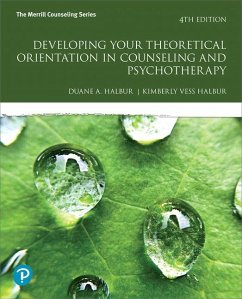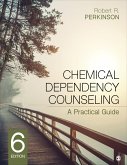Duane A. Halbur, Kimberly Vess Halbur
Developing Your Theoretical Orientation in Counseling and Psychotherapy
Duane A. Halbur, Kimberly Vess Halbur
Developing Your Theoretical Orientation in Counseling and Psychotherapy
- Broschiertes Buch
- Merkliste
- Auf die Merkliste
- Bewerten Bewerten
- Teilen
- Produkt teilen
- Produkterinnerung
- Produkterinnerung
An interactive guide for helping helping professionals choose a theoretical orientation Appropriate for mental health counselors, psychologists, social workers, school counselors, substance abuse counselors, psychotherapists, and peer helpers, Developing Your Theoretical Orientation in Counseling and Psychotherapy helps readers find a theoretical orientation aligned with their personal values and worldview. Theories are presented in the text in a way that allows the reader to identify quickly the philosophical and cultural foundations of the theories while also accessing the theories' goals…mehr
Andere Kunden interessierten sich auch für
![Counseling Children and Adolescents Counseling Children and Adolescents]() Counseling Children and Adolescents108,99 €
Counseling Children and Adolescents108,99 €![School Counselling in an Asian Cultural Context School Counselling in an Asian Cultural Context]() Mark HarrisonSchool Counselling in an Asian Cultural Context187,99 €
Mark HarrisonSchool Counselling in an Asian Cultural Context187,99 €![Climate Change and Youth Climate Change and Youth]() Linda GoldmanClimate Change and Youth34,99 €
Linda GoldmanClimate Change and Youth34,99 €![Encyclopedia of Counseling Encyclopedia of Counseling]() Encyclopedia of Counseling1.214,99 €
Encyclopedia of Counseling1.214,99 €![Counselling and Psychotherapy after Domestic Violence Counselling and Psychotherapy after Domestic Violence]() Jeannette RoddyCounselling and Psychotherapy after Domestic Violence39,99 €
Jeannette RoddyCounselling and Psychotherapy after Domestic Violence39,99 €![Chemical Dependency Counseling Chemical Dependency Counseling]() Robert R. PerkinsonChemical Dependency Counseling228,99 €
Robert R. PerkinsonChemical Dependency Counseling228,99 €![Therapy with Children and Young People Therapy with Children and Young People]() Colleen McLaughlinTherapy with Children and Young People37,99 €
Colleen McLaughlinTherapy with Children and Young People37,99 €-
-
-
An interactive guide for helping helping professionals choose a theoretical orientation Appropriate for mental health counselors, psychologists, social workers, school counselors, substance abuse counselors, psychotherapists, and peer helpers, Developing Your Theoretical Orientation in Counseling and Psychotherapy helps readers find a theoretical orientation aligned with their personal values and worldview. Theories are presented in the text in a way that allows the reader to identify quickly the philosophical and cultural foundations of the theories while also accessing the theories' goals and techniques. The 4th Edition is updated to include, among other things, a deeper discussion of the implications of empirically validated treatments and a new review of the implications of common-factor approaches.
Hinweis: Dieser Artikel kann nur an eine deutsche Lieferadresse ausgeliefert werden.
Hinweis: Dieser Artikel kann nur an eine deutsche Lieferadresse ausgeliefert werden.
Produktdetails
- Produktdetails
- Verlag: Pearson
- 4. Aufl.
- Seitenzahl: 144
- Erscheinungstermin: 12. Januar 2018
- Englisch
- Abmessung: 229mm x 178mm x 8mm
- Gewicht: 220g
- ISBN-13: 9780134805726
- ISBN-10: 0134805720
- Artikelnr.: 53610348
- Herstellerkennzeichnung
- Libri GmbH
- Europaallee 1
- 36244 Bad Hersfeld
- gpsr@libri.de
- Verlag: Pearson
- 4. Aufl.
- Seitenzahl: 144
- Erscheinungstermin: 12. Januar 2018
- Englisch
- Abmessung: 229mm x 178mm x 8mm
- Gewicht: 220g
- ISBN-13: 9780134805726
- ISBN-10: 0134805720
- Artikelnr.: 53610348
- Herstellerkennzeichnung
- Libri GmbH
- Europaallee 1
- 36244 Bad Hersfeld
- gpsr@libri.de
About our authors Dr. Duane Halbur’s research interests include the needs of school counselors, philosophical counseling, and the integration of technology in counseling. Along with teaching and writing, he works as a licensed counselor in a community agency specializing in children and families. Dr. Kimberly Vess Halbur’s research includes cultural competencies for the helping professions and medical fields.
BRIEF TABLE OF CONTENTS
1. Why Theoretical Orientation Is Important
2. Incorporating Theory Into Practice
3. Strategies to Find Your Theoretical Orientation
4. Six Schools of Thought and Need to Know Techniques
5. Case Examples for Integrating Theory Into Practice
DETAILED TABLE OF CONTENTS
1. Why Theoretical Orientation Is Important
o A Personal Experience
o The Big Puzzle
o What Is Theoretical Orientation?
o The Helpers Tool Belt
o What Can a Theoretical Orientation Do for Me?
o How Have Others Picked a Theoretical Orientation?
o What If Im Eclectic?
o Empirically Validated Therapies: Are They Better?
o Guidance from Common Factors: Do They All Work?
o Once I Have It, How Can I Use It?
o How Are Theoretical Orientation and Ethics Related?
o What to Take Home
o Reflection Questions
2. Incorporating Theory Into Practice
o Making Theory Useful: A Model
o Theory Development
o Importance of Your Life Philosophy
o Life PhilosophyIts Personal
o Schools of Thought
o Theories
o Goals and Techniques: Interventions at Work
o Counselors Are Diverse
o Resistance to Theories: Eclectic, Integrated, or Just Dont Know
o Does It Really Work?
o What to Take Home
o Reflection Questions
3. Strategies to Find Your Theoretical Orientation
o Find Yourself
o Articulate Your Values
o Survey Your Preferences
o Use Your Personality
o Taking the MBTI
o Capture Yourself
o Write Yourself As a Case Study
o Let Others Inspire You in Your Learning
o Read Original Works or Study with a Master
o Get Real
o Broaden Your Experiences
o What to Take Home
o Reflection Questions
o Suggested Readings and Webpages
4. Six Schools of Thought and Need to Know Techniques
o Historical Perspective
o Case Study
o Psychodynamic School of Thought
o Psychoanalytic Theory
o Analytical Psychology
o Individual Psychology
o Behavioral School of Thought
o Behavioral Therapy
o Humanistic School of Thought
o Person-Centered Therapy
o Existential Therapy
o Gestalt Therapy
o Pragmatic School of Thought
o Cognitive Behavioral Therapy (CBT)
o Rational Emotive Behavioral Therapy (REBT)
o Reality Therapy
o Constructivist School of Thought
o Multicultural Counseling and Therapy (MCT)
o Feminist Therapy
o Narrative Therapy
o Solution-Focused Brief Therapy (SFBT)
o Family Approaches School of Thought
o Bowen Family Systems Therapy
o Strategic Family Therapy
o Structural Family Therapy
o Need to Know Techniques
o Mindfulness
o Dialectical Behavioral Therapy (DBT)
o Resilience
o Strength-Based Approaches
o Distance Counseling
o What to Take Home
o Reflection Questions
5. Case Examples for Integrating Theory Into Practice
o Clinician Case Studies
o Case One: Evan
o Case Two: Jill
o Case Three: Anaya
o Comment on Clinician Cases
o Client Case Studies
o Case One: Tony
o Case Two: Hanae
o Case Three: Brenda
o Comment on Client Cases
o Supervision Case Studies
o Case One: Grace
o Case Two: Dominic
o Comment on Supervision Case Studies
o Techniques Case Studies
o Case One: Rosa
o Case Two: Maggie
o Comment on Techniques Case Studies
o What to Take Home
o Importance Revisited
o How Theory Is Found
o Benefit of the ITS Model to the Field
1. Why Theoretical Orientation Is Important
2. Incorporating Theory Into Practice
3. Strategies to Find Your Theoretical Orientation
4. Six Schools of Thought and Need to Know Techniques
5. Case Examples for Integrating Theory Into Practice
DETAILED TABLE OF CONTENTS
1. Why Theoretical Orientation Is Important
o A Personal Experience
o The Big Puzzle
o What Is Theoretical Orientation?
o The Helpers Tool Belt
o What Can a Theoretical Orientation Do for Me?
o How Have Others Picked a Theoretical Orientation?
o What If Im Eclectic?
o Empirically Validated Therapies: Are They Better?
o Guidance from Common Factors: Do They All Work?
o Once I Have It, How Can I Use It?
o How Are Theoretical Orientation and Ethics Related?
o What to Take Home
o Reflection Questions
2. Incorporating Theory Into Practice
o Making Theory Useful: A Model
o Theory Development
o Importance of Your Life Philosophy
o Life PhilosophyIts Personal
o Schools of Thought
o Theories
o Goals and Techniques: Interventions at Work
o Counselors Are Diverse
o Resistance to Theories: Eclectic, Integrated, or Just Dont Know
o Does It Really Work?
o What to Take Home
o Reflection Questions
3. Strategies to Find Your Theoretical Orientation
o Find Yourself
o Articulate Your Values
o Survey Your Preferences
o Use Your Personality
o Taking the MBTI
o Capture Yourself
o Write Yourself As a Case Study
o Let Others Inspire You in Your Learning
o Read Original Works or Study with a Master
o Get Real
o Broaden Your Experiences
o What to Take Home
o Reflection Questions
o Suggested Readings and Webpages
4. Six Schools of Thought and Need to Know Techniques
o Historical Perspective
o Case Study
o Psychodynamic School of Thought
o Psychoanalytic Theory
o Analytical Psychology
o Individual Psychology
o Behavioral School of Thought
o Behavioral Therapy
o Humanistic School of Thought
o Person-Centered Therapy
o Existential Therapy
o Gestalt Therapy
o Pragmatic School of Thought
o Cognitive Behavioral Therapy (CBT)
o Rational Emotive Behavioral Therapy (REBT)
o Reality Therapy
o Constructivist School of Thought
o Multicultural Counseling and Therapy (MCT)
o Feminist Therapy
o Narrative Therapy
o Solution-Focused Brief Therapy (SFBT)
o Family Approaches School of Thought
o Bowen Family Systems Therapy
o Strategic Family Therapy
o Structural Family Therapy
o Need to Know Techniques
o Mindfulness
o Dialectical Behavioral Therapy (DBT)
o Resilience
o Strength-Based Approaches
o Distance Counseling
o What to Take Home
o Reflection Questions
5. Case Examples for Integrating Theory Into Practice
o Clinician Case Studies
o Case One: Evan
o Case Two: Jill
o Case Three: Anaya
o Comment on Clinician Cases
o Client Case Studies
o Case One: Tony
o Case Two: Hanae
o Case Three: Brenda
o Comment on Client Cases
o Supervision Case Studies
o Case One: Grace
o Case Two: Dominic
o Comment on Supervision Case Studies
o Techniques Case Studies
o Case One: Rosa
o Case Two: Maggie
o Comment on Techniques Case Studies
o What to Take Home
o Importance Revisited
o How Theory Is Found
o Benefit of the ITS Model to the Field
BRIEF TABLE OF CONTENTS
1. Why Theoretical Orientation Is Important
2. Incorporating Theory Into Practice
3. Strategies to Find Your Theoretical Orientation
4. Six Schools of Thought and Need to Know Techniques
5. Case Examples for Integrating Theory Into Practice
DETAILED TABLE OF CONTENTS
1. Why Theoretical Orientation Is Important
o A Personal Experience
o The Big Puzzle
o What Is Theoretical Orientation?
o The Helpers Tool Belt
o What Can a Theoretical Orientation Do for Me?
o How Have Others Picked a Theoretical Orientation?
o What If Im Eclectic?
o Empirically Validated Therapies: Are They Better?
o Guidance from Common Factors: Do They All Work?
o Once I Have It, How Can I Use It?
o How Are Theoretical Orientation and Ethics Related?
o What to Take Home
o Reflection Questions
2. Incorporating Theory Into Practice
o Making Theory Useful: A Model
o Theory Development
o Importance of Your Life Philosophy
o Life PhilosophyIts Personal
o Schools of Thought
o Theories
o Goals and Techniques: Interventions at Work
o Counselors Are Diverse
o Resistance to Theories: Eclectic, Integrated, or Just Dont Know
o Does It Really Work?
o What to Take Home
o Reflection Questions
3. Strategies to Find Your Theoretical Orientation
o Find Yourself
o Articulate Your Values
o Survey Your Preferences
o Use Your Personality
o Taking the MBTI
o Capture Yourself
o Write Yourself As a Case Study
o Let Others Inspire You in Your Learning
o Read Original Works or Study with a Master
o Get Real
o Broaden Your Experiences
o What to Take Home
o Reflection Questions
o Suggested Readings and Webpages
4. Six Schools of Thought and Need to Know Techniques
o Historical Perspective
o Case Study
o Psychodynamic School of Thought
o Psychoanalytic Theory
o Analytical Psychology
o Individual Psychology
o Behavioral School of Thought
o Behavioral Therapy
o Humanistic School of Thought
o Person-Centered Therapy
o Existential Therapy
o Gestalt Therapy
o Pragmatic School of Thought
o Cognitive Behavioral Therapy (CBT)
o Rational Emotive Behavioral Therapy (REBT)
o Reality Therapy
o Constructivist School of Thought
o Multicultural Counseling and Therapy (MCT)
o Feminist Therapy
o Narrative Therapy
o Solution-Focused Brief Therapy (SFBT)
o Family Approaches School of Thought
o Bowen Family Systems Therapy
o Strategic Family Therapy
o Structural Family Therapy
o Need to Know Techniques
o Mindfulness
o Dialectical Behavioral Therapy (DBT)
o Resilience
o Strength-Based Approaches
o Distance Counseling
o What to Take Home
o Reflection Questions
5. Case Examples for Integrating Theory Into Practice
o Clinician Case Studies
o Case One: Evan
o Case Two: Jill
o Case Three: Anaya
o Comment on Clinician Cases
o Client Case Studies
o Case One: Tony
o Case Two: Hanae
o Case Three: Brenda
o Comment on Client Cases
o Supervision Case Studies
o Case One: Grace
o Case Two: Dominic
o Comment on Supervision Case Studies
o Techniques Case Studies
o Case One: Rosa
o Case Two: Maggie
o Comment on Techniques Case Studies
o What to Take Home
o Importance Revisited
o How Theory Is Found
o Benefit of the ITS Model to the Field
1. Why Theoretical Orientation Is Important
2. Incorporating Theory Into Practice
3. Strategies to Find Your Theoretical Orientation
4. Six Schools of Thought and Need to Know Techniques
5. Case Examples for Integrating Theory Into Practice
DETAILED TABLE OF CONTENTS
1. Why Theoretical Orientation Is Important
o A Personal Experience
o The Big Puzzle
o What Is Theoretical Orientation?
o The Helpers Tool Belt
o What Can a Theoretical Orientation Do for Me?
o How Have Others Picked a Theoretical Orientation?
o What If Im Eclectic?
o Empirically Validated Therapies: Are They Better?
o Guidance from Common Factors: Do They All Work?
o Once I Have It, How Can I Use It?
o How Are Theoretical Orientation and Ethics Related?
o What to Take Home
o Reflection Questions
2. Incorporating Theory Into Practice
o Making Theory Useful: A Model
o Theory Development
o Importance of Your Life Philosophy
o Life PhilosophyIts Personal
o Schools of Thought
o Theories
o Goals and Techniques: Interventions at Work
o Counselors Are Diverse
o Resistance to Theories: Eclectic, Integrated, or Just Dont Know
o Does It Really Work?
o What to Take Home
o Reflection Questions
3. Strategies to Find Your Theoretical Orientation
o Find Yourself
o Articulate Your Values
o Survey Your Preferences
o Use Your Personality
o Taking the MBTI
o Capture Yourself
o Write Yourself As a Case Study
o Let Others Inspire You in Your Learning
o Read Original Works or Study with a Master
o Get Real
o Broaden Your Experiences
o What to Take Home
o Reflection Questions
o Suggested Readings and Webpages
4. Six Schools of Thought and Need to Know Techniques
o Historical Perspective
o Case Study
o Psychodynamic School of Thought
o Psychoanalytic Theory
o Analytical Psychology
o Individual Psychology
o Behavioral School of Thought
o Behavioral Therapy
o Humanistic School of Thought
o Person-Centered Therapy
o Existential Therapy
o Gestalt Therapy
o Pragmatic School of Thought
o Cognitive Behavioral Therapy (CBT)
o Rational Emotive Behavioral Therapy (REBT)
o Reality Therapy
o Constructivist School of Thought
o Multicultural Counseling and Therapy (MCT)
o Feminist Therapy
o Narrative Therapy
o Solution-Focused Brief Therapy (SFBT)
o Family Approaches School of Thought
o Bowen Family Systems Therapy
o Strategic Family Therapy
o Structural Family Therapy
o Need to Know Techniques
o Mindfulness
o Dialectical Behavioral Therapy (DBT)
o Resilience
o Strength-Based Approaches
o Distance Counseling
o What to Take Home
o Reflection Questions
5. Case Examples for Integrating Theory Into Practice
o Clinician Case Studies
o Case One: Evan
o Case Two: Jill
o Case Three: Anaya
o Comment on Clinician Cases
o Client Case Studies
o Case One: Tony
o Case Two: Hanae
o Case Three: Brenda
o Comment on Client Cases
o Supervision Case Studies
o Case One: Grace
o Case Two: Dominic
o Comment on Supervision Case Studies
o Techniques Case Studies
o Case One: Rosa
o Case Two: Maggie
o Comment on Techniques Case Studies
o What to Take Home
o Importance Revisited
o How Theory Is Found
o Benefit of the ITS Model to the Field








